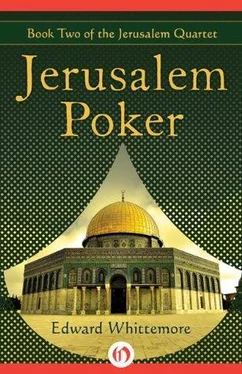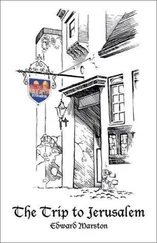Johann Luigi traveled briefly in the Levant and liked what he saw. By the beginning of the following year he had walked back as far as Budapest, where he decided to enter medical school, again chopping firewood to support himself. He received his medical degree and set himself up in private practice, specializing in cases of hysteria. Before long he converted to Judaism in order to marry one of his former patients, a young Jewish woman of Khasarian extraction whose family had been engaged in petty local trade in Budapest since the ninth century.
A son was born to the couple and named Munk, a curious tradition his wife's forebears had brought with them from Transcaucasia before they were converted to Judaism in the eighth century, a custom requiring the first male in every generation to be given the same name. In Sarah's family the traditional name was Munk, although no one could remember its significance. As for Johann Luigi, he was more than pleased with the name since it appealed to his own rather monkish tendencies.
About the same time Johann Luigi began planning another brief trip to the Levant. He would travel overland to Aleppo, he told his wife, and spend a few weeks there improving his Arabic. Then he would journey down the Tigris to the Persian Gulf, find a ship bound for Egypt and so back to Europe. In all he would be gone three months, he said, and he promised to write every day, not explaining how his letters could possibly arrive in Budapest before he did, nor how the distances proposed could be covered so quickly.
But little was known of Middle Eastern geography in those days, and perhaps nothing at all in a Budapest family engaged in petty local trade.
Nevertheless, Sarah and her family must have suspected more was involved when they saw how the young doctor went about preparing himself for his trip. Instead of writing to shipping agents, Johann Luigi disappeared into the Hungarian countryside for a full year, walking barefoot in all kinds of weather and sleeping in the open without a blanket, feeding himself exclusively on grasses and returning to Budapest only once, to be with his wife when their daughter Sarah was born midway through the year.
Yet no one mentioned this odd behavior. The women in Sarah's family had always loved their men well and Sarah wanted Johann Luigi to do whatever would make him happy, even if it meant he would be away from home for a while.
On a brisk autumn day in 1809, then, Johann Luigi lovingly embraced his wife and two children and left on a brief journey to the Levant, to be traced by daily letters sent home to Sarah.
That much was true. Johann Luigi did write letters home every day, often five or six times a day.
And given his passion for details, it wasn't surprising his letters also contained long reports on everything he observed, down to the smallest items. Thus mixed in with the lyrical passages describing his love for Sarah, there was interminable information on crops and trade, lists of cottage industries and analyses of local customs, all strung together in what was in effect an exhaustive diary of his travels.
For two years the heavy packets of letters arrived regularly from Aleppo. By then the inquisitive young Swiss had grown a long beard and learned the one hundred and fifty Arabic words for wine, having become to all appearances an erudite Arab merchant, well dressed in the Turkish manner, who went by the name of Sheik Ibrahim ibn Harun and explained his merry blue eyes by saying he had Circassian blood.
So skillful was his grasp of the Arab imagination that before he left his headquarters in Syria, to amuse himself, he transposed an episode from Gargantua into Arabic and inserted it in a privately published edition of the Thousand and One Nights, the tale so cleverly done it was immediately acclaimed as a lost Baghdad original.
During the next two years Johann Luigi's letters arrived erratically in Budapest. Nothing would be heard from him for months, then hundreds of letters would descend on Sarah in a single day. Now he was in Egypt, having arrived there by way of Petra, probably the first European to have seen that deserted stone city since the Middle Ages.
Pink, my love, he wrote of Petra to Sarah. And half as old as time.
In Cairo he established a reputation as an expert in Islamic law. He was urged to take a high position in the Islamic courts but gently refused, saying he had urgent business up the Nile. He was next heard from in Nubia eating dates, marching ten hours a day, covering nine hundred miles in a month.
But in 1813, in Nubia, there were also a few quiet weeks for the restless Johann Luigi. There, in a village on the fringe of the desert, he fell in love and lived briefly with the proud young woman who would one day become the great-grandmother of the Egyptian slave, Cairo Martyr.
Next he pushed south from Shendi down to the Red Sea and across to Jidda, where he disappeared.
Only for Sarah to find a procession of carts drawing up in front of her house a year later, heaped with thousands of envelopes and packets. In his guise as Sheik Ibrahim ibn Harun, it turned out, Johann Luigi had penetrated both Medina and Mecca during the missing year and actually kissed the black meteorite in the Kaaba.
He was the first explorer to see Abu Simbel, then mostly buried by sand, and wrote that Rameses' ear was three feet, four inches long, his shoulders twenty-one feet across, estimating correctly that the pharaoh must have been between sixty-five and seventy feet tall despite his notoriously self-indulgent life.
Once more Johann Luigi went to Cairo intending to lecture on Islamic law, but the plague struck the city and he went to St Catherine's monastery in the Sinai to escape it. There in 1817, two years before the great English explorer, Strongbow was born in southern England, Johann Luigi Szondi abruptly succumbled to dysentery and was buried without ceremony in an unmarked Moslem grave at the foot of Mt Sinai, within sight of the cave where the Albanian son unknown to him, the last of the Skanderbeg Wallensteins, would eventually produce his spectacular forgery of the original Bible.
Johann Luigi was only thirty-three when he died and he had visited Mecca fully half a century before Strongbow, who would be the next European to do so. It was true Strongbow's vast explorations would surpass those of the remarkable Johann Luigi. But it was also true the Englishman's haj would stretch over forty years, not a mere eight.
Long after Johann Luigi's death, letters in his familiar handwriting continued to arrive in Budapest from all parts of Africa and the Middle East. Tender letters filled with love, always promising that he would be home within the prescribed three months. Year after year they came — the last, four decades after his death.
But Sarah didn't know he was dead, and who could say that letter was the last?
There was always the chance another letter might find its way to Budapest from some obscure corner of the Levant, where Johann Luigi had entrusted it to a sleepy caravan merchant moving slowly through time on the back of a camel.
So when Sarah looked back on her life she couldn't help but consider her marriage perfect. As she passed into her eighth decade, well after most of her sisters and cousins had been widowed by husbands who had never left home, her husband was still sending her love letters. And even though he had wandered a bit, he had never failed to write home.
So Sarah died embracing his memory, listening to one of her granddaughters read aloud what was in fact Johann Luigi's last letter, delivered on the morning of the day she died, an exquisite description of a sunset at Mt Sinai that ended with the customary promise that soon, very soon now, he and his beloved Sarah would be together again.
Читать дальше












